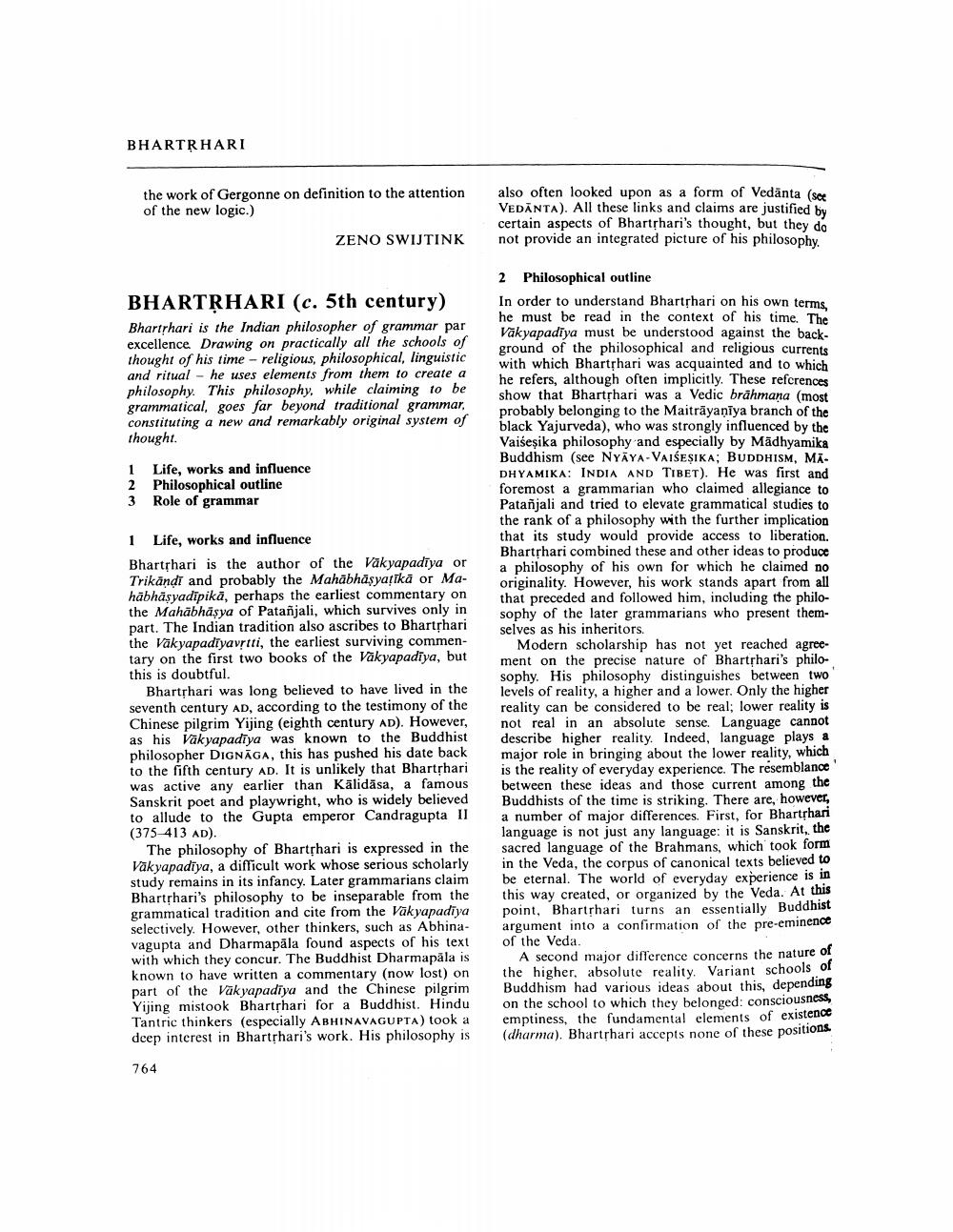Book Title: Reviews Of Diffeent Books Author(s): Johannes Bronkhorst Publisher: Johannes Bronkhorst View full book textPage 1
________________ BHARTRHARI the work of Gergonne on definition to the attention of the new logic.) also often looked upon as a form of Vedānta (see VEDANTA). All these links and claims are justified by certain aspects of Bhartshari's thought, but they do not provide an integrated picture of his philosophy. ZENO SWIJTINK BHARTRHARI (c. 5th century) Bhartyhari is the Indian philosopher of grammar par excellence Drawing on practically all the schools of thought of his time - religious, philosophical, linguistic and ritual - he uses elements from them to create a philosophy. This philosophy. while claiming to be grammatical, goes far beyond traditional grammar, constituting a new and remarkably original system of thought. 1 Life, works and influence 2 Philosophical outline 3 Role of grammar 1 Life, works and influence Bhartrhari is the author of the Vakyapadiya or Trikāndi and probably the Mahabhäsyarikā or Mahābhāsyadipika, perhaps the earliest commentary on the Mahabhäsya of Patanjali, which survives only in part. The Indian tradition also ascribes to Bharthari the Vakyapadiyavpiti, the earliest surviving commentary on the first two books of the Vakyapadiya, but this is doubtful. Bharthari was long believed to have lived in the seventh century AD, according to the testimony of the Chinese pilgrim Yijing (eighth century AD). However, as his Vakyapadi ya was known to the Buddhist philosopher DIGNĀGA, this has pushed his date back to the fifth century AD. It is unlikely that Bharthari was active any earlier than Kalidasa, a famous Sanskrit poet and playwright, who is widely believed to allude to the Gupta emperor Candragupta II (375-413 AD). The philosophy of Bharthari is expressed in the Vak yapadiya, a difficult work whose serious scholarly study remains in its infancy. Later grammarians claim Bharthari's philosophy to be inseparable from the grammatical tradition and cite from the Vākyapadiya selectively. However, other thinkers, such as Abhinavagupta and Dharmapala found aspects of his text with which they concur. The Buddhist Dharmapala is known to have written a commentary (now lost) on part of the Vak yapadiya and the Chinese pilgrim Yijing mistook Bharthari for a Buddhist. Hindu Tantric thinkers (especially ABHINAVAGUPTA) took a deep interest in Bharthari's work. His philosophy is 2 Philosophical outline In order to understand Bharthari on his own terms, he must be read in the context of his time. The Vakyapadiya must be understood against the background of the philosophical and religious currents with which Bharthari was acquainted and to which he refers, although often implicitly. These refcrences show that Bharthari was a Vedic brahmana (most probably belonging to the Maitrāyaniya branch of the black Yajurveda), who was strongly influenced by the Vaiseșika philosophy and especially by Madhyamika Buddhism (see NYAYA-VAISESIKA; BUDDHISM, MĀ. DHYAMIKA: INDIA AND TIBET). He was first and foremost a grammarian who claimed allegiance to Patanjali and tried to elevate grammatical studies to the rank of a philosophy with the further implication that its study would provide access to liberation. Bhartěhari combined these and other ideas to produce a philosophy of his own for which he claimed no originality. However, his work stands apart from all that preceded and followed him, including the philosophy of the later grammarians who present themselves as his inheritors. Modern scholarship has not yet reached agreement on the precise nature of Bhartphari's philosophy. His philosophy distinguishes between two levels of reality, a higher and a lower. Only the higher reality can be considered to be real; lower reality is not real in an absolute sense. Language cannot describe higher reality. Indeed, language plays a major role in bringing about the lower reality, which is the reality of everyday experience. The resemblance between these ideas and those current among the Buddhists of the time is striking. There are, however, a number of major differences. First, for Bharthari language is not just any language: it is Sanskrit, the sacred language of the Brahmans, which took form in the Veda, the corpus of canonical texts believed to be eternal. The world of everyday experience is in this way created, or organized by the Veda. At this point, Bhartrhari turns an essentially Buddhist argument into a confirmation of the pre-eminence of the Veda. A second major difference concerns the nature of the higher, absolute reality. Variant schools of Buddhism had various ideas about this, depending on the school to which they belonged: consciousness, emptiness, the fundamental elements of existence (dharma). Bhartrhari accepts none of these positions. 764Page Navigation
1 2 3
